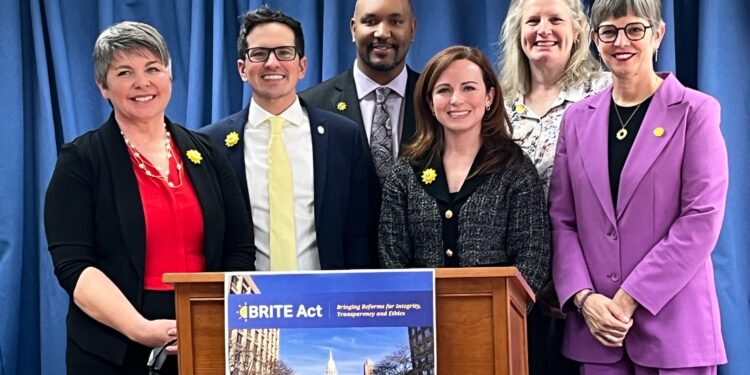LANSING, Mich. (WZMQ) – It’s Sunshine Week, a week created to encourage people to actively participate in their government and encourage them to seek information that improves their lives and communities. Sunshine Week has been celebrated every March since 2005, started by the American Society of Newspaper Editors, to highlight the importance of open, accessible, and transparent government through freedom of information laws.
To highlight the week, state lawmakers are talking about legislation to create more accountability and transparency within Michigan’s government.
Today in the Senate Oversight Committee, State Senators Jeremy Moss(D-Southfield), and Ed McBroom (R-Waucedah Township) gave testimony on bills they introduced last fall, but have been working on for nearly a decade.
“We listened intently to the advocates and stakeholders who testified at our last committee hearing on this topic and took into account some of their concerns on ways to clarify, expand, and bring about more transparency.” Senator Moss said.
The Senator’s bills would amend Michigan’s open records act, lowering restrictions on Freedom of Information Act requests (FOIA) and requiring FOIA coordinators within the legislature.
“Transparency in our government is a necessary and important step in growing and restoring trust and confidence in our government and the people elected to it,” said McBroom. “These laws recognize the government belongs to the people and that secrecy and hidden information weakens their ability to hold their government accountable.”
The hearing today was the second for the Senators. They outlined changes to the legislation that Senator McBroom said would add to transparency, as well as ley out clear restrictions to keep necessary information private. Some of the restrictions include exemptions on FOIA requests involving the appointment process including job applications, documents involved in the processes to suspend or remove public officials, and communications between legislators and members of their own districts. It also narrows exemptions for House and Senate caucuses, changing the language to be more specific and only restricting requests on documents related to advice, opinions, or recommendations about public policy or district work.
The changes also amend parts of the FOIA application process. Previously, the person who submitted a FOIA request would have to prove the requested information was within the public’s interest. Now, it’s flipped so the FOIA coordinator is now the one who has to prove a lack of public interest upon denial.
The bill would also introduce subscriptions to newsletters from offices or departments with releases of up-to-date information. The bills would be prospective, not retroactive if passed, meaning they would not apply to past documents or situations.
Senator McBroom says they are still working on portions of the bill that have to do with the way the FOIA coordinators would be appointed.
Another package of bills in Michigan’s House seeks to improve standards for government ethics. Quentin Turner, Executive Director of Common Cause Michigan explained that for years, Michigan was just one of two states with no financial disclosure law for elected or public officials.
The BRITE Act, or Bringing Reforms for Integrity, Transparency, and Ethics is an effort from the House Ethics and Oversight Committee that would require officials to register connections to 527 and 501c4 organizations, reduce the influence of lobbying and financial interests, and increase enforcement of election and campaign finance law violations, and tighten gift disclosures.
“After decades of being among the least transparent state governments in the nation, Michigan is now moving in the right direction. This legislative package will strengthen our ethics and transparency laws and make government more accountable to the people we represent,” said Secretary of State Jocelyn Benson. “I’m grateful for the leadership of the bill sponsors and look forward to strengthening our system so that Michigan is known as a place where the practices of governing, legislating, and leading are done with integrity by all involved, in accordance with the will of the voters.”
Representative Betsy Coffia (D- Traverse City) is a sponsor of one of the seven bills in the package. She said that in her district, the issue of government transparency is a common topic.
“Across the political spectrum, voters care about this and they want, and they deserve to be confident that our decisions, as their representatives in Lansing, are truly in the public interest,” Coffia said.
The Senate bills will now head back to the full Senate for a vote before working its way through the House. The BRITE Act bills have just been introduced in the House and will need to be assigned to a committee before seeing the first vote.
Similar transparency legislation has failed in the legislature in the past, but lawmakers say they are optimistic these bills will complete their journey to the governor’s desk.










